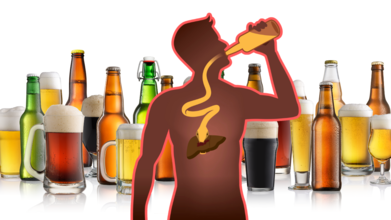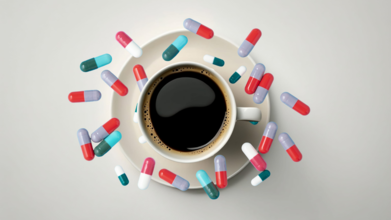- Health Conditions A-Z
- Health & Wellness
- Nutrition
- Fitness
- Health News
- Ayurveda
- Videos
- Medicine A-Z
- Parenting
- Web Stories
UK Woman Drops 83 Pounds With 1:1 Diet After Declining Gastric Sleeve, Feels Like 'Walking On Air'

Credits: PA Media
For most people who are battling obesity, the road to losing weight is a long, complicated road that is riddled with confusion, deprivation, and fear of not succeeding. But for Donna McCaulsky, a 50-year-old South East London civil servant, one crucial decision changed everything—turning down weight loss surgery and opting instead for a managed meal plan that saw her lose an astonishing 83 pounds. Her choice to go on the 1:1 Diet, or Cambridge Diet, not only transformed her body but transformed her life. She now labels the experience as "surreal," and says she feels as though she's "walking on air."
McCaulsky was told in 2020 that she should have gastric sleeve surgery following a crisis Body Mass Index (BMI) of 60.1—a indicator of severe obesity. By 2022, she weighed 350 pounds because of continued snacking, exacerbated by long-standing insomnia, an autoimmune disorder, and heightened appetite brought about by the use of steroids over a long period of time. The physical cost was augmented by mental fatigue and a rising hopelessness. But rather than giving in to going under the knife, she took time out to consider other alternatives.
"I knew I had to regain control of my health," McCaulsky says to PA Real Life. "But I was terrified of the side effects of surgery. I just wanted to try something natural, something I could commit to in the long term."
That's when she discovered the 1:1 Diet by Cambridge Weight Plan—a meal-replacement, low-calorie diet that assigns participants a personal consultant for weekly check-ins and support.
What Is the 1:1 Diet?
Initially called the Cambridge Diet, the 1:1 Diet is a medically developed, calorie-restricted weight-reduction programme created in the 1980s and since rebranded to stress the "one-to-one" guidance factor. It involves using specially designed meal replacement foods like shakes, soups, smoothies, and savory alternatives like pasta meals and rice meals. These are supplemented with the nutrients necessary for everyday health—maintaining that dieters shed pounds without sacrificing nutrition.
The daily caloric intake may range from a low of 415 to 1,500 calories based on stage and goal of the individual. The formal plan has six specific stages—from a severe weight-reduction stage through to a maintenance stage.
But what truly sets this diet apart is the integrated accountability system: every dieter is assigned a certified consultant who provides weekly one-on-one meetings. These sessions ensure motivation remains high, address obstacles, and customize the plan as results are achieved.
How 1:1 Diet Works?
The 1:1 Diet is generally contrasted with ketogenic diets due to the way it works. When the body is supplied with very little carbohydrate, it starts to burn reserve fat for fuel—a process termed ketosis. By lowering the daily calorie input to a mean of 500 to 1,200 kcal, the body is put into a sizeable calorie deficit, which causes fast burning of fat and subsequently visible weight reduction.
Whereas other experts are skeptical about the long-term viability of these low-calorie diets, the 1:1 Diet separates itself with the steady reintroduction of natural food and structured guidance to ensure dieters keep their results and build better habits.
For McCaulsky, the impact of the 1:1 Diet was nothing short of transformative. Within 18 months, she dropped from 350 pounds to 182 pounds. Her BMI now sits at 31.1, which while still classified as obese, is a significant improvement from her starting point. More importantly, she says, the mental shift has been profound.
"Now I feel like I have freedom. I can go into any shop and choose a size 12 (US size 8) dress. I don't need to do my shopping in plus-size stores anymore. It's priceless, that freedom," she explained.
She attributes the program not only for the physical transformation, but for making her have control over her life once more—without surgery.
“I don’t regret turning down the surgery. I’ve now made a change for life and it was the best decision.”
Role of Personal Support
The personal consultant element is central to the diet’s success. It transforms the journey from a solitary struggle into a supported mission. Dieters are guided not just nutritionally but emotionally—helping them manage setbacks, stress eating, or lifestyle changes.
Research indicates that individuals receiving consistent dietary guidance are far more likely to maintain a program than individuals doing it on their own. The 1:1 model's focus on this type of consistent, customized coaching is just one reason why it continues to be favored, particularly by individuals looking for fast yet sustainable results.
Does 1:1 Diet Work for Everyone?
Although the outcomes are impressive, it should be noted that the 1:1 Diet is not for everyone. Very low-calorie diets are potentially harmful to some people, including those with an underlying medical condition or eating disorder. Further, the early phases of the plan are restrictive and might not be practicable over the long term without appropriate medical supervision.
Health experts warn that fast weight loss must always be undertaken in consultation with medical professionals, and preferably accompanied by sustained lifestyle changes, such as greater physical activity and regular mental health counseling.
Donna McCaulsky's tale is a strong reminder that change is never out of reach—no matter what age, medical background, or how long you've been battling your weight. Her experience demonstrates that for some, surgery isn't the sole means of transformation. With guidance, encouragement, and a clinically proven system like the 1:1 Diet, meaningful, lasting change can be achieved.
Yet, prior to exploring any low-calorie or meal replacement diet, it's crucial to visit a healthcare professional or a registered dietitian to check for personal appropriateness and prevent any health hazard.
Disclaimer: This is an informational article and not a substitute for professional medical guidance. Be sure to consult with a qualified healthcare professional prior to initiating any new diet program or treatment regimen.
How Excess Drinking Weakens Your Gut And Attacks Your Liver?

Credits: Health and me
Heavy drinking is a recognized risk factor for liver injury, but a new report by the University of California San Diego reveals an previously unrecognized mechanism that amplifies this damage. Long-term drinking not only causes direct damage to the liver but also initiates a toxic cycle involving the gut, in which bacteria spill into the blood and attack the liver, leading to cumulative injury.
This new research, published in Nature, combines human liver biopsies and mouse models of alcohol-associated liver disease to reveal a molecular pathway that could redefine our understanding of alcohol-related liver damage.
The research points out a protein known as mAChR4, which is present in the small intestine, and is critical in supporting the immune defenses of the gut. Prolonged alcohol consumption inhibits the synthesis of mAChR4 and hence the creation of GAPs, or goblet cell-associated antigen passages. GAPs are the unique structures that facilitate the education of the immune system in order to effectively respond to microbes.
When GAPs do not form, gut bacteria have a greater likelihood of leaking from the intestines and infecting organs such as the liver. Inside the liver, the bacteria have the ability to increase inflammation and tissue damage, adding to the liver damage that has been inflicted by alcohol. In essence, alcohol compromises the gut-liver barrier while, at the same time, establishing an environment in which bacterial invasion can occur, making it a self-sustaining cycle of harm.
The UC San Diego researchers determined that restoring mAChR4 function had the potential to fix GAPs and strengthen the immune system's attack on rogue gut bacteria. This therapy, which may be accomplished with drugs that directly stimulate mAChR4 or by altering related signaling pathways, decreased liver damage in laboratory models.
Although limiting alcohol intake is the most straightforward method of safeguarding the liver, targeting mAChR4 represents a promising therapeutic strategy for alcohol abusers or individuals already damaged by liver injury. Curiously, mAChR4 is also expressed in the brain, where it modulates habit formation and addiction. Reduced levels of this protein have been noted in individuals with alcohol use disorder, paving the way for future treatments that target both liver function and addictive behavior.
Effects of Alcohol on Gut and Liver Health
Outside the liver, alcohol can significantly interfere with gut health in several ways. Six mechanisms explain how long-term drinking damages the digestive tract:
1. Acid Reflux
Alcohol loosens the lower esophageal sphincter, permitting stomach acid to flow back and produce heartburn or gastroesophageal reflux disease (GERD).
2. Diarrhea
Excessive drinking upsets the balance of bacteria in the intestines, favoring "bad" bacteria that stimulate inflammation and intestinal permeability. This causes a leaky gut syndrome, where poisons enter the blood.
3. Gastritis
Alcohol interferes with mucus production within the stomach, which makes the lining susceptible to inflammation, pain, nausea, and vomiting.
4. Bloating
Alcohol changes sugar metabolism and microbial equilibrium, in addition to stimulating yeast overgrowth, all of which promote gas production and bloating.
5. Liver Damage
Long-term drinking results in alcoholic fatty liver disease and alcoholic steatohepatitis. Fat deposition, inflammation, and toxin-induced cell damage can evolve into cirrhosis, liver cancer, or liver failure, sometimes requiring transplantation.
6. Pancreatic Damage
Alcohol is metabolized by the pancreas into poisonous byproducts that can inflame the organ in an illness known as pancreatitis. Regular heavy alcohol consumption, particularly along with smoking, increases the risk for acute and chronic pancreatitis and long-term complications such as diabetes and pancreatic carcinoma.
The recognition of mAChR4 as a central figure in the gut-liver axis reveals a number of avenues for research. Drug therapies that enhance mAChR4 function within the gut would restore GAP function, reinforcing immunity against translocating bacteria. At the same time, drugs that increase mAChR4 function in the brain would decrease alcohol craving and treat the disorder itself, attacking both cause and effect of chronic alcoholism.
This dual potential makes mAChR4 an especially attractive target in the fight against alcohol-related disease. Clinical trials of mAChR4-targeted drugs are already in progress for other neurological disorders like schizophrenia, which provides the hope that those drugs might one day find use against alcohol-related liver disease as well.
What Is The Alcohol and the Gut-Liver Axis?
Appreciation of gut-liver interaction puts the wider public health significance of chronic alcohol use into perspective. Interventions to address gut integrity, immune response, and liver defense may be able to complement traditional measures aimed at decreased alcohol consumption.
In addition, increased awareness of how alcohol impacts not only the liver but also gut bacteria may encourage behavior change. Most individuals downplay the insidious, long-term effects of alcohol on digestive health, thinking damage to the liver only follows decades of misuse. Changes in gut barrier function and bacterial translocation, however, can hasten liver injury even in moderate chronic drinkers.
How Can You Prevent and Treat Alcohol-related Liver Damage?
For individuals, the clearest path to protecting liver health remains reducing alcohol intake. However, for those who struggle with dependency, therapies targeting mAChR4 may provide an adjunctive strategy to prevent liver injury while supporting recovery.
Nutrition and lifestyle also contribute to sustaining liver and gut health. A diet high in fiber, probiotics, and anti-inflammatory food can promote healthy gut bacteria and immune function, possibly preventing some of the adverse effects of alcohol.
The UC San Diego research reveals a key feedback loop of alcohol-induced liver damage: long-term drinking compromises gut barriers, enabling bacteria to travel to the liver, exacerbating injury. Targeting mAChR4 might interrupt this self-destructive process, providing new hope for treating alcohol-related liver disease.
This study supports an important message: alcohol not only harms the liver outright; it upsets the gut-liver axis and compounds damage. With advancing science, learning more about the molecular mechanisms underlying these effects can inform preventive measures and novel treatments and offer hope for millions globally affected by alcohol-associated liver disease.
Gut Doctor Reveals The Top 3 Causes Of Bloating You Should Stop Ignoring

(Credit-Canva)
A common phrase that many people say things like ‘I feel so bloated’ or ‘My stomach looks so bloated’ but what does it exactly mean? When a person feels bloated it is more than just an aesthetic or look issue. It's not just the fact that their abdomen looks swollen, but it means that they are feeling lot of pressure in their stomach due to build up of gas.
It is an uncomfortable sensation that can distract you from your work, make it difficult to focus on important things as well as causing you abdominal pain.
Considering this, and it being a common issue for many people, you will find a barrage of online advice telling you to drink ‘anti-bloating’ drink or try ‘that anti-bloating’ exercise. To deal with this, however, one must know exactly why they are bloated in the first place.
What Are The Top 3 Causes Of Bloating?
Dr. Saurabh Sethi, a gastroenterologist, addresses a very common concern in his practice: chronic bloating. He explains that if you feel bloated every time you eat, it's likely due to one of three reasons he frequently sees in his patients.
While many people believe they know the cause, Dr. Sethi points out that the most common culprit is often overlooked. He aims to provide clarity on these issues, noting that the final reason he discusses is the one most likely causing problems for the average person. By understanding the root cause, individuals can take the right steps toward finding relief.
Number 3 Reason for Bloating Constipation
Dr. Sethi explains that a common cause of bloating is constipation, and it isn't always what you think. While many people believe they're fine as long as they have a daily bowel movement, the real issue can be a "slow colon." This means food waste moves through your digestive system at a sluggish pace.
When this happens, food sits in your intestines for a much longer time than it should. This creates a perfect environment for the bacteria in your gut to break down the leftover food through a process called fermentation. This process releases a significant amount of gas, leading to that uncomfortable feeling of fullness, pressure, and bloating you experience after eating.
Number 2 Reason for Bloating: IBS or Functional Dyspepsia
In this case, the main problem is an overly sensitive gut. Dr. Sethi points out that for people with Irritable Bowel Syndrome (IBS) or functional dyspepsia, the nerves and muscles in the intestines can move in a chaotic or irregular way. Instead of a smooth, coordinated process, the muscles can spasm or move too quickly or too slowly.
This irregular motion can easily trap pockets of gas, causing pressure and a visibly distended abdomen. This gut dysfunction is often linked to an imbalance in the gut's bacterial environment, which can make the intestines more sensitive to normal digestive processes and cause them to overreact, leading to heightened symptoms of gas and bloating.
Number 1 Reason for Bloating: Diet
According to Dr. Sethi, your diet is the most frequent and significant cause of chronic bloating. The primary culprits are specific types of carbohydrates that your small intestine has a hard time fully absorbing. These include lactose found in dairy products, fructose from many fruits and sweeteners like high-fructose corn syrup, and fructans in common foods like wheat, onions, and garlic.
When these undigested carbs reach your large intestine, the bacteria there have a feast, releasing a huge amount of gas as a byproduct. Dr. Sethi emphasizes that even healthy foods, such as broccoli, beans, and certain fruits, can trigger these symptoms if your digestive system is sensitive to these particular ingredients.
Your Daily Dose Of Caffeine May Make Antibiotics Less Effective, Study Warns

Credits: Health and me
In an era where antibiotic resistance is increasingly recognized as a global health threat, new research suggests that everyday dietary substances could unintentionally undermine the effectiveness of life-saving drugs. A recent study led by Professor Ana Rita Brochado and her team at the Universities of Tübingen and Würzburg reveals that caffeine and other common food ingredients can influence bacterial defenses, reducing the potency of certain antibiotics.
A new study finds that common items such as caffeine can disrupt the efficacy of antibiotics, renewing fears over food and drink choices when undergoing treatment. Scientists from the Universities of Tübingen and Würzburg discovered that ingredients in everyday foods and beverages are able to modify the regulation of bacterial genes, and especially of E. coli, suppressing the internalization of antibiotics like ciprofloxacin. This type of "low-level" resistance is brought about not by classical resistance genes but through subtle modifications to bacterial transport systems, which indicates that what we eat with drugs may determine the outcome of treatment. Although the impact differs between species of bacteria, the results highlight the need to take diet and lifestyle into account when treating infections.
How Everyday Substances Affect Bacteria?
The research highlights the complex interaction between bacteria and their surroundings. Escherichia coli (E. coli), which is often the cause of urinary tract infections, sepsis, and gastrointestinal illness, employs advanced regulatory systems to perceive chemical cues from its environment. Such mechanisms can have a profound impact on the way that bacteria respond to antibiotics, potentially enabling them to withstand treatments that would otherwise be effective.
To investigate this, scientists carried out a systematic screen of 94 compounds, including prescription medications, antibiotics, and common dietary constituents. They were interested in how these molecules influence major genetic regulators and transport proteins of E. coli. Transport proteins are channels and pumps within bacterial cell membranes, regulating the passage of molecules into and out of the cell. Alterations in their regulation can have a large impact on survival of bacteria and, importantly, antibiotic penetration into bacterial cells.
Caffeine and the Antagonistic Effect
One of the most surprising discoveries was the effect of caffeine on antibiotic action. "Our data reveal that a number of compounds can subtly but systematically affect gene regulation in bacteria," reports PhD candidate and first author Christoph Binsfeld. Caffeine, specifically, leads to a cascade starting with the gene regulator Rob, which eventually changes the action of several transport proteins in E. coli.
This cascade decreases antibiotic uptake, such as that of ciprofloxacin, and it becomes less effective. Scientists have termed this effect an 'antagonistic interaction,' in which an innocuous compound indirectly disrupts drug action. Although caffeine does not possess antimicrobial activity, its action in manipulating bacterial gene regulators illustrates the possibility that ordinary food choices may inadvertently affect antibiotic efficacy.
Not All Bacteria Are Affected Equally
Perhaps most intriguingly, the researchers observed no weakening effect from caffeine in Salmonella enterica, a close relative of E. coli. This indicates that even closely related species of bacteria may react differently to the same stimulus. Differences in transport pathways or differences in how bacteria take up drugs may account for these differences.
Professor Karla Pollmann, Dōshisha University President, highlights the general importance: "Such basic research into the impact of substances ingested daily reinforces the important role of science in understanding and solving real-world issues."
Implications for Antibiotic Resistance
The results reveal a type of antibiotic resistance that is distinct from traditional genetic resistance mechanisms. Described as 'low-level' resistance, the process cannot be attributed to mutations within antibiotic-target genes but instead occurs due to regulatory changes and environmental plasticity. The interactions are important to understand as it might shape the way antibiotics are prescribed and bring about attention to include food and environment factors when administering treatment.
"The research questions whether patients are what they eat during antibiotic treatment," states Dr. Brochado. "It indicates that what was considered to be innocuous could be affecting the outcome of the treatment. This can impact clinical guidelines, especially when accuracy in antibiotic dosing and efficacy matters."
What Is The Role of Diet in Drug Effectiveness?
Although caffeine was the main target, the study highlights that other usual food ingredients can also affect bacterial reactions to antibiotics. Processed foods, drinks, and supplements could have substances that modulate bacterial transport proteins or gene expression, which in turn can affect the efficacy of antimicrobial therapy.
This study is not to say that moderate intake of caffeine or any food ingredient is hazardous by nature. Rather, it points out the intricacies of interaction between diet, bacterial physiology, and drug action, providing a novel insight for patients as well as healthcare professionals.
The research, which was released in PLOS Biology, paves the way for investigations into why low-level antibiotic resistance occurs and how it can be stopped. Physicians would be forced to take environmental and nutritional issues into consideration when they prescribe antibiotics, especially for E. coli infections. The results could also impact new approaches to therapy taking into account bacterial acclimation to common substances.
Though additional clinical research is warranted, our research offers insight into how non-antimicrobial compounds influence the behavior of bacteria and the efficacy of drugs," Binsfeld says. "Patients and clinicians alike need to be aware of these possible interactions, particularly when treating resistant infections.
For the time being, the research is a warning. Even ubiquitous, apparently innocuous food components can affect how bacteria react to treatment. While caffeine is still a commonly ingested substance with well-established benefits for vigilance and cognition, its ability to interfere with the uptake of antibiotics points to the need to examine all environmental factors when combating infection.
Healthcare providers may increasingly need to provide guidance not just on medication timing and dosing, but also on diet and lifestyle factors that could influence therapeutic outcomes. As our understanding of bacterial adaptability grows, integrating nutritional awareness into treatment plans may become an essential component of effective antibiotic therapy.
© 2024 Bennett, Coleman & Company Limited

